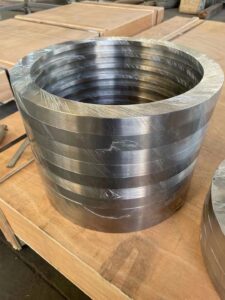- Top Star Metal Materials Co.,Ltd
Mtaerial:Titanium GR2/ GR7/GR12/GR16
Size: Custom Made
Density:4.51g/cm3
Technic:Forging and machining
Standard:ASTM B381/ASME SB381
Application:Heat exchangers,Petrochemical, Aerospace
Titanium Grade:GR1,Gr2,GR3,GR4,GR5,Ti6Al4V ELI,GR6,GR7,Gr9,GR11,GR12
Standard:ASTM B381,ASTM B348,ASTM F67,ASTM F136,AMS4928R,AWS,ASME,MIL,DIN.
Tensile strength Rm/MPa(>=):895
Yield strength Rp0.2(MPa):828
Elongation A4D(%):10
Reduction of area Z(%):25
1. Low density, high strength, high specific strength
Titanium has a density of 4.51 g/cm³, which is 57% of steel, just over half, and less than twice that of aluminum. Its strength is three times that of aluminum. Titanium alloys have the highest specific strength among commonly used industrial alloys. The specific strength of titanium alloys is 3.5 times that of stainless steel, 1.3 times that of aluminum alloys, and 1.7 times that of magnesium alloys. Therefore, it is an essential structural material in the aerospace industry.
2. Excellent corrosion resistance
The corrosion resistance of titanium depends on the presence of an oxide film. It exhibits much better corrosion resistance in oxidizing environments compared to reducing environments, where it can experience high corrosion rates. Titanium is highly resistant to corrosion in various corrosive environments, such as seawater, wet chlorine gas, hypochlorite and chlorite solutions, nitric acid, chromic acid, metal chlorides, sulfides, and organic acids.
3. Excellent heat resistance
Typically, aluminum loses its high mechanical properties at around 150°C, and stainless steel at 310°C. However, titanium alloys maintain good mechanical properties at temperatures around 500°C. When aircraft speeds reach 2.7 times the speed of sound, the surface temperature of aircraft structures reaches 230°C, making aluminum and magnesium alloys unsuitable. Titanium alloys, on the other hand, meet the requirements. Titanium exhibits excellent heat resistance, making it suitable for turbine disks and blades in aerospace engine compressors, as well as for the skin of the rear fuselage of aircraft.
4. Excellent low-temperature performance
Certain titanium alloys, such as Ti-5Al-2.5SnELI, exhibit increased strength as the temperature decreases. However, their ductility is not significantly reduced, and they maintain good ductility and toughness at low temperatures, making them suitable for use in ultra-low-temperature environments.

Our company was founded in 2005, committed to providing professional technology for aerospace, military, industrial, medical, and has a professional team to provide technical support.